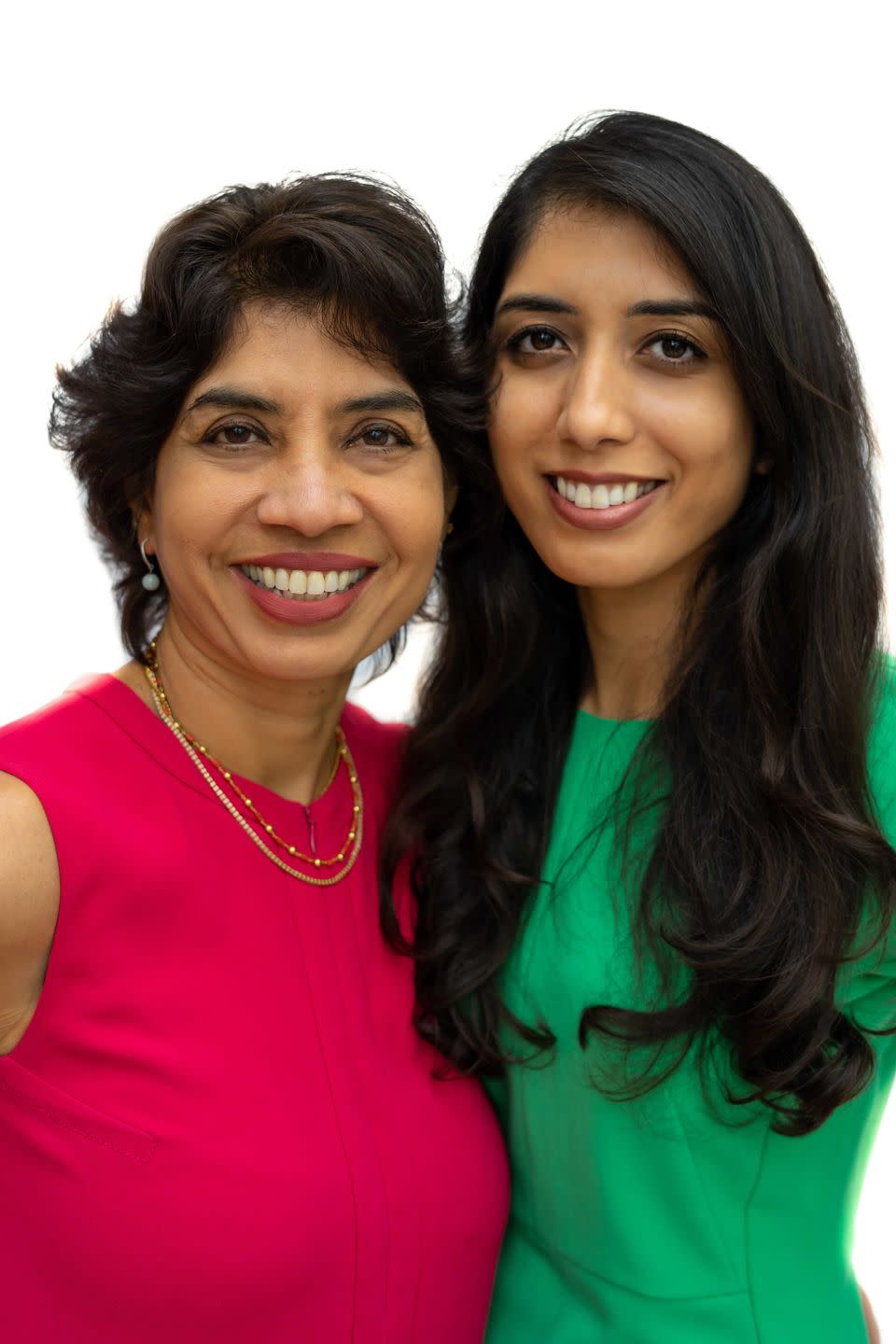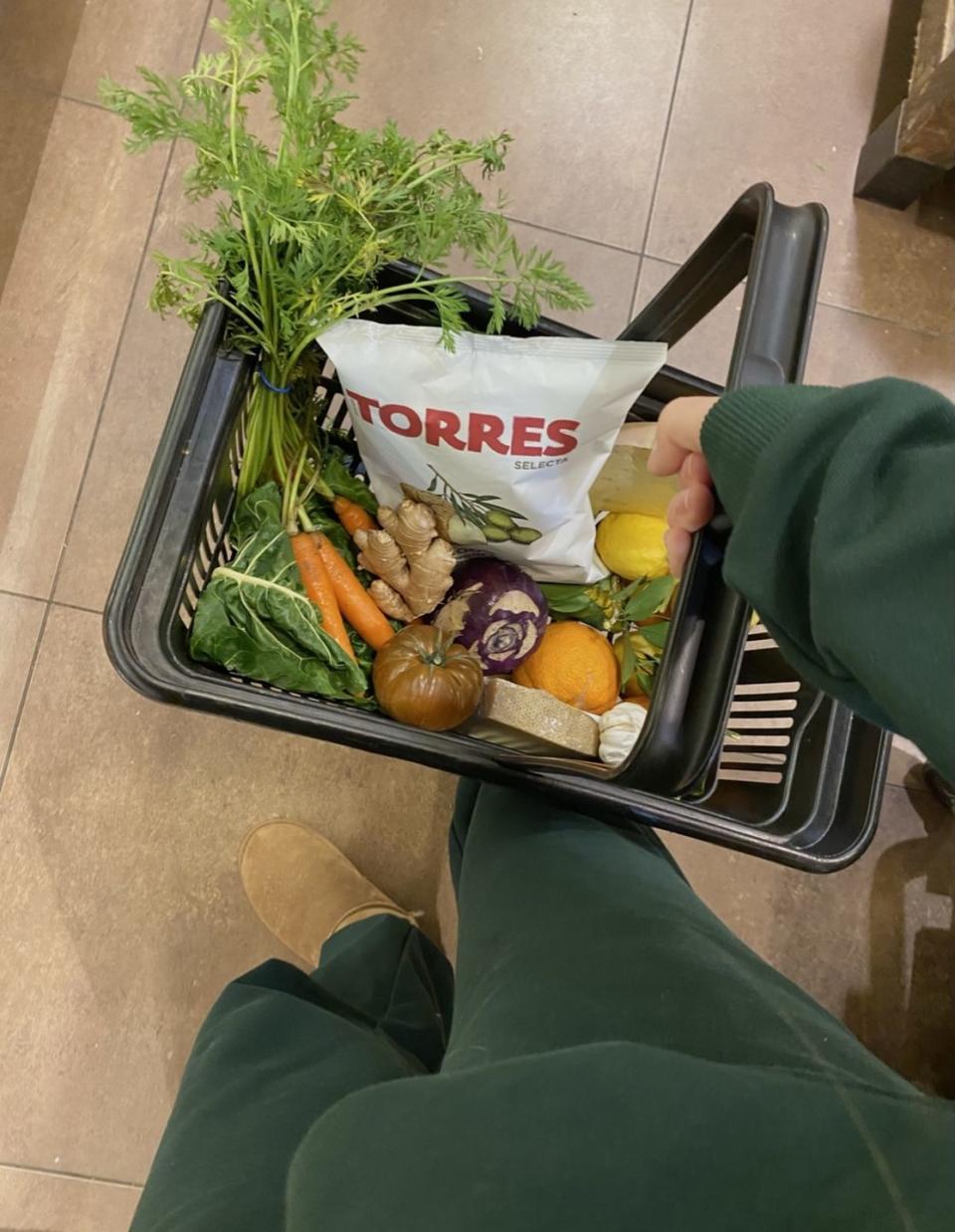'My painful bloating after meals had a surprising link to this common hormonal health condition’

If you’ve scrolled through social media recently, you might have noticed a rise in the term ‘gut health’ floating around - and, more specifically, video posts titled ‘how I healed my gut’. Indeed, interest in how to calm tummy issues has been soaring, with searches on Google for ‘food intolerance testing’ - which it is claimed can help get to the bottom of gut problems - have grown by 250% since this time last year.
I myself am one of the many who have become increasingly alert to anything ‘gut health’ online. For the past 12 months I’ve been experiencing symptoms of constant, painful bloating, as well as sickness and nausea after eating. I was baffled - I hadn’t had any drastic changes to my diet, live an active lifestyle and look after myself. What could be going on?
Tummy trouble
When my stomach symptoms became unbearable at the start of this year, I began investigating what could be the cause. This journey took me right back to being diagnosed, aged 17, with a condition called polycystic ovary syndrome (PCOS).
I was diagnosed when - after suffering with painful acne and three years of irregular periods (meaning just three to four bleeds a year) and much reassurance that I would ‘grow’ into my cycle - I was sent for a scan which showed cysts were present on my ovaries, which was my first indication that I might have PCOS. However, something that I wasn’t aware of at the time is that ultrasound scans should not be used as a diagnostic tool in adolescents. Cysts on the ovaries are very common in teenagers and not always an indication of PCOS, so a scan cannot be relied on solely on it’s own.
According to research, you must score two out of three in the Rotterdam Criteria to get a diagnosis. These include irregular or absent periods, and clinical or biochemical signs of irregularity which can identified by a blood test. The clinical signs can include symptoms of androgen (testosterone) excess, e.g. acne, scalp hair loss, excess body hair growth etc.
The scan, along with my other symptoms, was enough for me to push for a diagnosis, but it’s worth noting that three out of four women will never get a diagnosis as often health professionals are not joining the dots.
If you’re not acquainted with PCOS, then here’s a little explainer. It is a common hormonal condition which affects the way the ovaries function, and affects at least one in 10 women of reproductive age worldwide. These are the most common symptoms:
Absent or Irregular periods with cycles over 35 days
Excessive hair growth on the face and body
Adult acne, usually around the jawline/chin
Infertility
Insulin resistance
But there are many other less well-known signs of the condition:
Anxiety
Depression
Disordered eating (particularly binge eating)
Excess weight gain, specifically around the stomach
Sleep disturbances including sleep apnoea
Pregnancy complications (pregnancy-related diabetes called gestational diabetes)
Higher risk of long-term chronic conditions including womb cancer, type 2 diabetes and possibly heart disease
Gut disturbances and IBS
After being told I had PCOS, I was given advice from my GP as to how to manage my symptoms. This included exercising for 40 minutes three times a week, eating minimal sugar and coming back when I wanted to have a baby since, I'd most likely have fertility issues.
As a teenager who wasn’t worrying about diet, weight or motherhood, I was actually left feeling more anxious, overwhelmed and lost as to how to live with my diagnosis. It turns out, many women experience similar interactions with medical professionals, and there is a lot of stigma and shame attached to a PCOS diagnosis, which stops women pushing for help.
However, as I passed into my early twenties, my periods started showing up more ‘regularly’ out of the blue - with cycles between 28 and 33 days a cause for celebration. I was also living an active lifestyle and doing a course of accutane to help with my acne - my most prominent symptom of hormonal issues at the time - and I wasn’t experiencing excessive hair growth or weight gain. I thought I had my PCOS under control.
Gut feeling
Skip to last year, aged 25, when I started experiencing painful bloating after every meal. This wasn’t just any ordinary tummy swell after a larger plate than usual - but to the point of nausea and vomiting on some occasions. In between mealtimes I also felt strangely sluggish, despite continuing to live an active lifestyle and remaining a healthy weight.
Then things got even worse. Aside from feeling tired all the time, periods of stress seemed to be triggering my long cycles once more, and despite no drastic diet changes I started to gain a little more weight. This further exacerbated bouts of anxiety around food: what can I eat that won’t make me feel sick? Will I feel bloated after this meal?
This is when my aforementioned investigations brought up the idea that my PCOS could be linked to the state of my gut health. During the years when my periods were regular and my skin was calm (my main teenage priorities) I had neglected to pay much attention to this more hidden area of my health. Through my latest research, I discovered that women living with PCOS like me have less diverse and beneficial gut bacteria and are more at risk of conditions like irritable bowel syndrome (IBS).
Just to caveat here, while IBS symptoms such as severe bloating are more common in women with PCOS, it's important to emphasise that this is just one of the lesser known symptoms but if you suspect you also have symptoms of IBS, it is recommended to seek the help of your doctor or a medical professional first to rule out any other underlying causes.
Breaking the cycle
At this point I sought the expertise of Rohini Bajekal, a nutritionist who has PCOS herself, and who is co-author of Living PCOS Free along with her mother, Dr Nitu Bajekal, a Senior Consultant ObGyn. Her philosophy is to make small, achievable lifestyle and dietary changes that focus on adding in more nutrition, rather than taking particular items away. This is something that, as someone who loves food, resonated with me.

Bajekal began by advising me to book a specific PCOS blood test which you can do through your GP or through private medical services such as Thriva to check all of my hormone levels. She also encouraged me to keep a food and lifestyle diary with details of my sleep, stress levels, alcohol intake prior to our conversations, to highlight what eating habits corresponded with when I felt my best and worst post-meal time. My test results came back showing that I was actually borderline PCOS, with high testosterone levels, but normal blood sugar levels, which is why my cycles were generally not too irregular.
Armed with this knowledge, Bajekal helped me create a personal plan of action when it came to my food choices and exercise routine. These are some of her top tips that I’ve been putting into practice daily:
Eat in line with your circadian rhythm
I would typically eat a small breakfast (coffee and a snack on the go, anyone?) followed by a light lunch and then a larger dinner. However, there have long been signs this wasn’t working for my body. I was feeling hungry and energy-depleted by 3pm, and the post-dinner fullness left me feeling sluggish and nauseous.
‘Our hormones love routine,’ says Bajekal. ‘Try to have set meal times daily, with a hearty breakfast soon after waking, a good-sized lunch and a smaller dinner. Research shows that eating a bigger breakfast and lunch is more beneficial for those with insulin resistance than a greater number of meals and snacks throughout the day. This helps nurture your circadian rhythms and regulate your internal body clock.
Aim to have your last meal by 7pm in the evening, if possible, to allow a gentle overnight fast. This is not to encourage a caloric restriction, but rather a pattern in which you adjust your meal timings to support your body’s natural rhythms, thereby improving metabolism and digestion.’
With this in mind, I swapped to a bigger breakfast and lunch helped keep my energy up throughout the day. In the evening, a lighter dinner helped to keep my stomach settled, and avoided any bloating.
2. Move in a way that works for you
I consider myself an active person, with a workout routine that features plenty of intense HIIT. But I have been mainly moving in short bursts of energy. I’ve got a busy job that requires sitting down for most of the day - with lunch eaten in a rush at my desk and evenings often spent on the sofa in front of the TV with dinner.
However, Bajekal notes that consistent movement is key. ‘Moving your body regularly is a key pillar in managing the symptoms of PCOS, for the maintenance of health and for reducing the risk of long-term issues associated with the condition,’ she explains. ‘Find an activity you enjoy and do it frequently throughout the week, bringing in lower-intensity, slow weighted workouts.’ Talking of which, see our PCOS-friendly workouts here.

On this point, I started doing Pilates and weights-based workouts, or more enjoyable cardio such as cycling - and also incorporated more walks into my day. Indeed, one of the biggest takeaways from my conversation with Bajekal was how important it is to get your steps in throughout the day. She taught me that something as simple as going for a 15-minute walk after a meal can help with glucose spikes and digestion, which can in turn help curb the cravings I felt soon after each meal.

However, when eating it’s important to be present. ‘Being in a constant state of hustle and on the go means we don’t listen to our bodies, but digestion starts in the mouth,’ notes Bajekal. ‘So keep your phone away and enjoy your food without the distraction of the screen. Sit at a table and chew your food well. In general, it takes around 20 minutes to feel full after eating.’ Incorporating these changes helped me notice a drastic decrease in my bloating after each meal, and I actually enjoyed what I was eating more. Win, win.
3. Avoid extremes in order to make sustainable changes
When it comes to making changes for our health, we can all fall into the trap of succumbing to extremes, myself included. One thing I've always struggled with is the idea of ‘good’ and ‘bad’ days when it comes to food - and I’ve always found it tough to not write-off a day that was on track for optimum nutrition and be left feeling guilty after an entire bar of Cadbury’s was consumed.

Of course, I know deep down that there are no such things as ‘good’ and ‘bad’ foods, but it’s a fine line to walk when it comes to being aware of what you’re eating in order to make healthy choices, without letting it consume your thoughts. What’s more, it turns out that many people with PCOS are battling disordered eating that often goes undiagnosed.
It’s important to take an anti-diet approach, says Dr Nitu Bajekal, a senior consultant obstetrician and gynaecologist, who is co-author of Living PCOS Free with her daughter Bajekal. ‘As there is an increased risk of disordered eating in people with PCOS, restrictive or fad diets such as low-carb or low-fat diets can be potentially triggering for some, even if they reach their weight loss goal,’ she explains. ‘Even a plant-based approach may hinder your management if underlying mental health issues or eating disorders are not addressed. It is better to focus on having an overall healthy dietary pattern while addressing mental health issues with the other lifestyle pillars.’
As such, Bajekal suggests making small swaps where you can in order to allow the changes to resonate long-term. ‘Showing ourselves more compassion on your journey with PCOS will help you to be more sustainable in making changes long term,’ she explains. ‘Putting your attention on dieting or following unsustainable plans will result in “yo-yo-ing” and weight cycling, which can put strain on becomes less beneficial for your mental and physical health.’
Indeed it’s important not to be afraid of certain foods - like carbohydrates. Without them, you can’t have a healthy menstrual cycle and - since our brain runs on glucose to function - skipping them won’t do a whole lot of good for your mental clarity either. ‘Rather than considering low-carb options, we should be looking at the nutritional quality of them instead,’ explains Bajekal. ‘Going for the whole grain bread option over the low carb white bread option for example is going to be much more beneficial.’
It’s about being mindful of the swaps you’re making and drowning out the noise of diet culture. ‘A dietary pattern centred around whole plant foods, rich in fruit, vegetables, whole grains (such as oats), legumes (beans, lentils, soya, peas), nuts and seeds is one of the healthiest choices you can make,’ adds Bajekal. As for me? Learning more about the nutritional value of foods, as well as the best way to eat in line with my circadian rhythm, meant my feelings of bloating and lethargy drastically decreased.

I made simple swaps like adding in more plant protein such as tofu into a vegetable stir-fry and focusing on fibre, by including a handful of greens in meals or antioxidant rich berries at breakfast. I also learnt that when consumed regularly, minimally processed soya foods (such as tofu and edamame) have been consistently shown to help with the symptoms of PCOS (such as weight gain) and improve many of the metabolic issues such as insulin resistance.

4. Listen to your body
The best piece of advice I got was to trust my instinct when it came to my body - and to listen to my gut. If you feel something is off with your cycle or are experiencing any of the other symptoms I’ve talked about in thus article, then be persistent with your doctors (GP?) about getting tests done.
‘Many of us struggle to listen to the cues our body gives us,’ says Dr Bajekal. ‘It’s easy to feel overloaded by external stimuli and a dizzying amount of advice on how to live a better life. In reality, no one knows your body better than you do and the good news is that it’s never too late to get to know your body better.’
Their book, Living PCOS Free, closes with some affirmations - that can be printed out and stick on your mirror, or written on post-it notes - to remind you that your health conditions don’t define you, your body is strong, and deserves to have kindness shown to it. Try reciting these:
‘My mind and body are strong and resilient’
‘I listen to my body and take things at my own pace’
‘I am beautiful on the inside and it shines through on the outside’
‘I move my body to look after myself’
‘My self-care is important and worth making time for’
‘I am as kind and loving to myself as I am to others’
Getting in sync
So how have I been feeling now? It’s been around four months since I started my journey to improving my gut health and understanding how good nutrition can impact on my PCOS symptoms. I’ve learnt that there’s no quick way to heal - and no special tea that can instantly reduce bloating (TikTok, I’m looking at you).
But mainly I’ve learnt to slow down in all aspects of my life - while eating food, moving by body and keeping stress to a minimum. I’ve been going for walks after my meals, prioritising my high-protein high fibre breakfast and lunches to fuel my day, and focusing on making plant-based meals with plenty of greens more of a staple in my diet. My bloating is back to normal levels (AKA, my jeans are still unbuttoned after a Sunday roast, but the painful swelling isn’t part of my routine) - and I haven’t been sick since making these adaptations.
If you’re struggling with PCOS too, then I know how difficult it can be to ask for help - but I encourage you to do, be that your doctor or other health professional. I promise you that it will get better.
You Might Also Like


